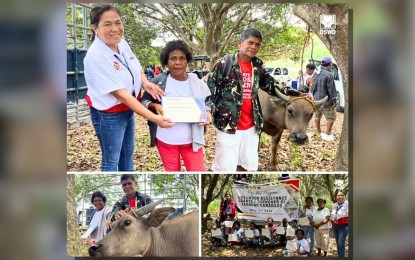
LIVELIHOOD SUPPORT. Nanay Fanny Victoria, one of the Pag-Abot Program clients, receives livelihood assets from the Department of Social Welfare and Development (DSWD), including a carabao for her farm in in Barangay Sto. Niño in Bamban, Tarlac on May 24, 2024. Nanay Victoria also received PHP10,000 outright cash aid as part of the livelihood package. (DSWD photos)
MANILA – The Department of Social Welfare and Development (DSWD) is determined to addressing issues sorted out on the World Bank (WB) report on indigenous peoples (IPs), Undersecretary Fatima Aliah Dimaporo said on Monday.
Dimaporo, representing Secretary Rex Gatchalian, thanked the WB for the invitation in the launching of the study report titled “No Data, No Story: Indigenous Peoples in the Philippines” which shed light on crucial issues such as education, health, and access to clean water among the IPs.
“We are resolute in tackling these challenges by refining our strategies and collaborating closely with the well-being of the indigenous communities,” Dimaporo said during the launch at the EDSA Shangri-La Hotel in Mandaluyong City.
The DSWD, she said, has remained steadfast in its commitment to addressing the unique needs of IPs through various initiatives like the Pantawid Pamilyang Pilipino Program (4Ps) and the Kapit-Bisig Laban sa Kahirapan-Comprehensive and Integrated Delivery of Social Services (KALAHI-CIDSS).
“Recently, we have bolstered our support for indigenous peoples by incorporating ethnicity variables in social safety net programs, as exemplified by the Modified Conditional Cash Transfer (MCCT) program for IPs in geographically isolated and disadvantaged areas,” she added.
Dimaporo said the DSWD has implemented the IPs community-driven development program which underscores the agency’s dedication to empowering indigenous communities in conflict-affected and vulnerable areas by providing them access to essential services and fostering their involvement in culturally sensitive community-driven development processes.
To recall, the DSWD even had collaborated recently with the World Bank in crafting the “Panahon ng Pagkilos” project to enhance services for marginalized communities, particularly IPs affected by climate change.
Dimaporo also cited the DSWD partnership with the National Commission on Indigenous Peoples (NCIP) and other partners, which, she said, remains indispensable.
“We, in the department, believe that collaboration with other government agencies and the private sector will intensify our efforts. Together we will continue to uplift the lives of the indigenous communities,” she said.
Dimaporo said the DSWD has started conducting a pilot profiling of IPs, with the initial phase completed in Capas, Tarlac and plans to extend it to Mindanao.
This initiative, she said, aims to gather comprehensive data to better understand IPs’ needs and take informed actions, particularly in social protection.
“Again, on behalf of our Secretary, let us continue working together, fueled by the insights from the World Bank’s study, to achieve our goal of providing opportunities and enhancing the well-being of IPs in the Philippines,” she added.
Livelihood support
On May 24, the DSWD turned over sustainable livelihood support to 10 Aeta families in Barangay Sto. Niño in Bamban and Capas, Tarlac.
The livelihood aid includes one carabao each worth PHP50,000 which can be used to make their farms production and PHP10,000 outright cash assistance for farming maintenance costs.
“The provision of carabaos and cash aid aims to enhance the agricultural capabilities of the Pag-abot clients, and promotes self-sufficiency and economic stability among them,” DSWD Social Technology Bureau (STB) Assistant Director Marilyn Moral said in a news release on Monday.
“This initiative ensures that reintegrated Aetas will have a decent life and livelihood that is sustainable. This will help them build a new life after they were reached out by the Pag-Abot Team and reintegrated into their communities,” she said.
Moral said these Aetas were among the clients who were reached out by the Pag-Abot Team during its expanded Pag-Abot sa Pasko program last December 2023.
“After the reach-out operations, the DSWD has continued to support and reintegrate them into their respective Aeta communities in Tarlac,” she said.
Nanay Fanny Victoria, 54, who was among the Aetas assisted by the Pag-Abot Program, expressed her gratitude for the help she received from the DSWD.
“Ngayon na lang po namin naranasan na binigyan kami ng malaking blessing, kaya salamat po sa Diyos… Ngayon po ay natanggap namin yung blessing mula sa Pag-abot ng DSWD kaya maraming-maraming salamat sa kanilang tulong na naibigay sa amin na mga katutubo (This is the first time we have experienced receiving such a great blessing so we thank God… Today, we received a blessing from the DSWD’s Pag-Abot program, and we are very grateful for the help they have given to us indigenous peoples,” a beaming Nanay Fanny said.
Nanay Fanny said the assistance will greatly help her family, especially in providing their daily needs.
“Magagamit po namin ito sa pagtatanim po ng kamote, bigas, at tsaka po kaunting palay para hindi na po kami magugutuman (We will use this for planting sweet potatoes, rice, and some grains so that we will no longer go hungry),” she said.
Launched in July 2023, as a priority program of Gatchalian, the Pag-Abot Program is being implemented in Metro Manila to reach out to people living and staying on the streets and provide them with the necessary and appropriate interventions, as well as opportunities to improve their social and economic status and fulfill their fundamental rights. (PNA)
 The Philippine News Agency is a web-based newswire service of the Philippine government under the supervision of the News and Information Bureau (NIB) of the Presidential Communications Office (PCO).
The Philippine News Agency is a web-based newswire service of the Philippine government under the supervision of the News and Information Bureau (NIB) of the Presidential Communications Office (PCO).